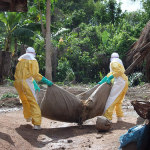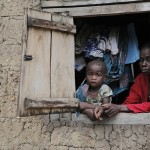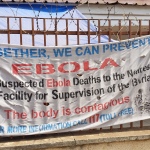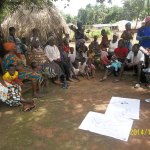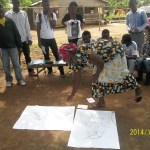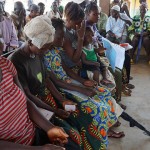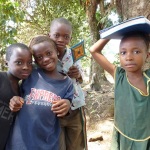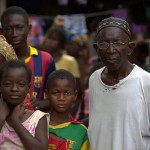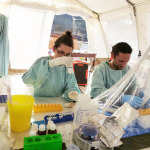Background: A major challenge to outbreak control lies in early detection of viral haemorrhagic fevers (VHFs) in local community contexts during the critical initial stages of an epidemic, when risk of spreading is its highest (“the first mile”). This paper documents how a major Ebola outbreak control effort in central Uganda in 2012 was experienced from the perspective of the community. It asks to what extent the community became a resource for early detection, and identifies problems encountered with community health worker and social mobilization strategies.
Continue reading →
Despite more than 25 documented outbreaks of Ebola since 1976, our understanding of the disease is limited, in particular the social, political, ecological, and economic forces that promote (or limit) its spread. In the following study, we seek to provide new ways of understanding the 2013-2015 Ebola pandemic. We use the term, ‘pandemic,’ instead of ‘epidemic,’ so as not to elide the global forces that shape every localized outbreak of infectious disease. By situating life histories via a biosocial approach, the forces promoting or retarding
Continue reading →
The Sierra Leonean diaspora was active in responding to the Ebola outbreak that hit Sierra Leone in March 2014, both by providing financial and material support, and through direct communication with relatives, friends and colleagues back home. This paper looks at the role of diaspora communications on health seeking behaviour in Sierra Leone. It examines the range of communication strategies employed by members of the diaspora; the dynamics of communications as the epidemic spread during 2014/15, and the role of diaspora associations in liaising with
Continue reading →
The Community Led Ebola Action (CLEA) has empowered communities to do their own analysis and take their own action to become Ebola-free in Sierra Leone. CLEA has focused on triggering collective action by inspiring communities to understand the urgency and the steps they take to protect themselves from Ebola. Community Mobilisers have facilitated this process and communities have modified norms, beliefs and behaviours in response to the conditions around them. The CLEA Approach was used to trigger 9,285 communities in Sierra Leone as of April
Continue reading →
The Ebola outbreak in West Africa has reinvigorated the debate about the role of ‘social mobilisation’ and ‘community engagement’, not only in response to devastating disease but a range of other intractable issues affecting Africa and the rest of the developing world. But what do we mean by ‘social mobilisation’? And why are we only learning now that community leadership is important? Sierra Leone’s communities are the true heroes of the Ebola response. Over the course of 18 months, a huge proportion of the population
Continue reading →
This briefing explores how rumours about Ebola in Sierra Leone influences people’s perception and response to Ebola, from the political, historical and social perspectives. Despite the efforts of the World Health Organisation to control the Ebola outbreak, achieving zero cases and providing support for survivors, rumours about the cause of Ebola and the response to it continue to circulate. These rumours, a product of the initially over stretched and poorly implemented Ebola response, were more often linked to long-term issues of structural violence that also contributed to the unprecedented
Continue reading →
The Ebola outbreak in West Africa differed from others in its unprecedented size and the high proportion of human-to-human transmission occurring in the community. This report presents an analysis of the impact of Community Care Centres (CCCs) on communities in Sierra Leone. Much has been written about the leadership and coordination of the response – or the lack of it. The emphasis of this evaluation is on the views on the development, implementation and relevance of the CCCs from the perspective of the communities next
Continue reading →
Nearly half the population of Sierra Leone is under the age of 18 years and the impact of the Ebola crisis on their lives now and on their future opportunities has been far-reaching: no school; loss of family members and friends to the virus; and changing roles and responsibilities in the home and the community. While the priority now remains meeting the goal of zero cases, the Government of Sierra Leone (GoSL) is also developing a comprehensive strategy aimed at supporting communities to recover from
Continue reading →
There have been numerous recent analyses of the different manifestations of ‘resistance’ and ‘reticence’ that continue to be critical in Guinea. The socio-historical context that has contributed to deep-rooted mistrust of the State and authority (a sense of ‘abandonment’ [the West has only returned to intervene in Guinea to ‘count cases’ and international actors will again abandon the country when cases are ‘acceptably low’]; heavy-handed or repressive interventions; the perception that elites treat people as if they are disposable and unworthy etc.) is well recognised.
Continue reading →
This paper seeks to understand the fear many Guineans feel towards Ebola response initiatives and why the educators, doctors and burial teams have sometimes encountered resistance, occasionally violent. Resistance has been catastrophic for the epidemic, preventing treatment, contact tracing and quarantine, permitting its spread. The paper sketches a history of dissent and violence during the epidemic before showing how some actions that Ebola response teams interpret as ‘resistance’ are less actions ‘against’ Ebola response, than actions that have their own cultural logics. But the paper
Continue reading →
